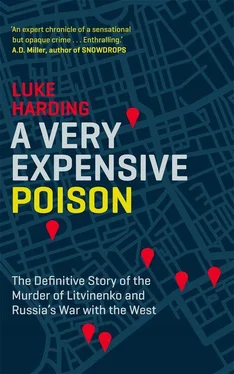CARTER: I wouldn’t like you to think that this is some kind of pompous political statement, but since all this happened I would like you to know very clearly what my position regarding this matter is. As you understand last month I was granted British citizenship and I very much love this country, and its people, although unfortunately I haven’t learnt English language completely yet. I am proud to be able to say that I’m a British citizen. Yes, they did try to kill me and possibly I may die, but I will die as a free person, and my son and wife are free people. And Britain is a great country.
Litvinenko says western politicians are to blame for treating Putin as a respectable international leader:
CARTER: I understand that this case is not a criminal one. I understand that everybody will be regarding this case as a political one. No, rather, I understand that this case is going to be perceived by everyone as political, but this case is not political, this case is criminal. I feel very upset that this criminal PUTIN sits at the G8 as its Chairman, at the same table as the British prime minister Tony BLAIR. Having sat this murderer next to themselves at the same table western leaders have actually untied his hands to kill anyone anywhere.
INTERPRETER: To kill what?
CARTER: To kill anyone anywhere. And of course I understand the west wants to get gas and oil from Russia, but one shouldn’t be involved in political activity if one doesn’t have political beliefs. And beliefs can’t be traded for gas and oil. Because when businessman is trading he’s trading with his money but when a politician is trading he is trading with the Sovereignty of his country and the future of his children.
The buzzer sounds, signalling the tape is finishing. Litvinenko tells Hyatt:
CARTER: I have a request for you, Inspector. I trust you completely … In case there is from the top, administrative pressure for political reasons, I am asking him [Hyatt] to be firm in his position and to bring this case to the end, as far as it is possible.
Litvinenko’s remarks would turn out to be prescient. The Scotland Yard detectives seem touched by his faith in them. DI Hyatt promises to ‘do absolutely everything within my power to ensure that this case is properly investigated’. He adds: ‘I know that this process has been extremely difficult because of your medical condition, and I just want to thank you for your time, your patience and your help with getting as much information to us as possible in the way that you have done.’
* * *
Litvinenko’s condition was rapidly deteriorating. On 20 November, the same day as his last police interview, doctors moved him to intensive care. Here it was easier to monitor the patient and, if necessary, to intervene. His heart rate was becoming abnormal; his major organs failing.
The medics treating him were in unchartered territory. Litvinenko’s case was problematic: he wasn’t behaving like a patient who had ingested thallium. He had severe bone marrow failure and gut damage, which fitted. But he lacked one key symptom of thallium poisoning – peripheral neuropathy, pain or numbness in his fingers and feet. ‘It was still a bit of a mystery,’ one doctor said. Professor John Henry – an expert on poisoning – examined Litvinenko twice. He found that his handshake was still extremely firm. Henry had previously told Sky TV that Litvinenko was a victim of radioactive thallium. Now he had doubts.
Meanwhile, those close to Litvinenko were reluctantly concluding he was unlikely to survive.
The Kremlin would subsequently accuse Berezovsky and Goldfarb of cynically exploiting Litvinenko as part of their long-running public-relations campaign against Putin. In fact, Litvinenko made it abundantly clear – as the Scotland Yard transcripts show – that he held Putin personally responsible for his poisoning. And he wanted to send this message to the world.
Litvinenko’s lawyer, George Menzies, began drafting a statement on his behalf. Menzies later said that the ideas in it were wholly Litvinenko’s. ‘I was doing my best, in personal terms, to represent what I truly believed to be Sasha’s state of mind and sentiment,’ he said. Its themes – Litvinenko’s pride in being British, his love of his wife, his belief as to the source of his illness – mirrored what his client thought, Menzies said.
Goldfarb and Menzies took the draft to the hospital. They showed it to Marina. Her reaction was negative. She believed her husband would pull through and that writing a last testament was tantamount to giving up on him. Pragmatically, they told her: ‘Better to do it now than later.’
Menzies consulted with Tim Bell, chairman of the London PR firm Bell Pottinger. Bell’s company had worked for Boris Berezovsky since 2002, helping the exiled oligarch through various legal scrapes, and had assisted the Litvinenkos as well. Bell said he thought the text was too gloomy and read like a ‘deathbed statement’. ‘I didn’t think it was the right thing to do because I still hoped and believed Sasha would live,’ Bell said.
Goldfarb read out the A4 sheet to Litvinenko in intensive care, translating it from English to Russian. At one point Goldfarb made a movement with his arms, mimicking the flight of an angel flapping its wings. Litvinenko endorsed the statement in its entirety, confirming: ‘This is exactly what I want to say.’ Litvinenko then signed and dated it – 21 November 2006, his signature trailing off into a raised black swirl.
The statement read:
I would like to thank many people. My doctors, nurses and hospital staff who are doing all they can for me; the British police who are pursuing my case with rigour and professionalism and are watching over me and my family. I would like to thank the British government for taking me under their care. I am honoured to be a British citizen.
I would like to thank the British public for their messages of support and for the interest they have shown in my plight.
I thank my wife, Marina, who has stood by me. My love for her and my son knows no bounds.
But as I lie here I can distinctly hear the beating of wings of the angel of death. I may be able to give him the slip but I have to say my legs do not run as fast as I might like. I think, therefore, this may be the time to say one or two things to the person responsible for my present condition.
You may succeed in silencing me but that silence comes at a price. You have shown yourself to be as barbaric and ruthless as your most hostile critics have claimed.
You have shown yourself to have no respect for life, liberty or any civilised value.
You have shown yourself to be unworthy of your office, to be unworthy of the trust of civilised men and women.
You may succeed in silencing one man but the howl of protest from around the world will reverberate, Mr Putin, in your ears for the rest of your life. May God forgive you for what you have done, not only to me but to beloved Russia and its people.
TV cameras and media had gathered outside the hospital’s main gate, waiting for news. They’d been there since Monday morning, 20 November, in the wake of an interview given by Litvinenko to the journalist David Leppard and published the previous day by the Sunday Times.
Sixteen floors above them, Litvinenko asked Goldfarb if he was a big story. He was – but not much was known about Litvinenko, other than that he was a prominent critic of Putin’s, and desperately ill. Goldfarb said: ‘Sasha, if you really want the message to be seriously put across, we need a photo.’ Marina was against the idea, and saw it as an invasion of privacy. But Litvinenko agreed, and said: ‘Yes, if you think it’s needed, let’s do it.’
Goldfarb rang Bell Pottinger and spoke to Jennifer Morgan, Bell’s liaison. Morgan in turn called a photographer she knew, Natasja Weitsz. Weitsz arrived at the hospital and was escorted upstairs past a police guard. She was with Litvinenko for mere minutes. He pushed his green hospital gown to one side so as to reveal the electro-cardiagram sensors attached to his heart. Weitsz shot a couple of frames of Litvinenko: bald, gaunt and defiant, staring with cornflower-blue eyes directly at the camera lens. The image was cropped around its haunting subject. It went round the world.
Читать дальше












